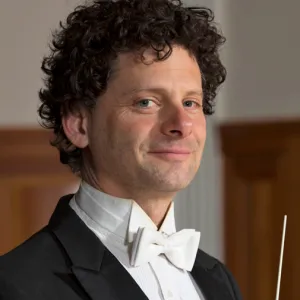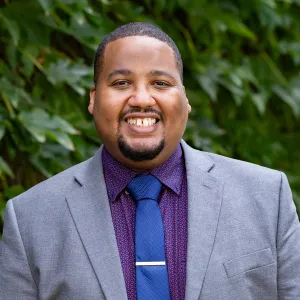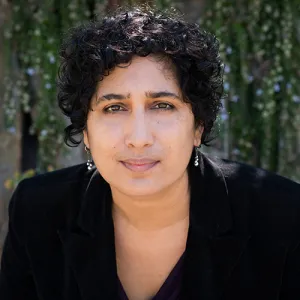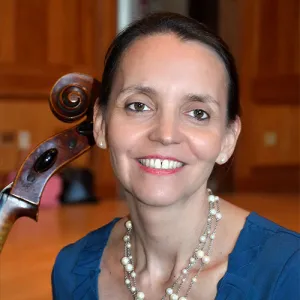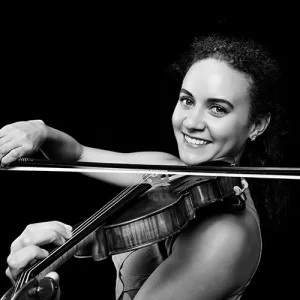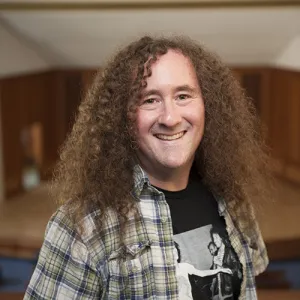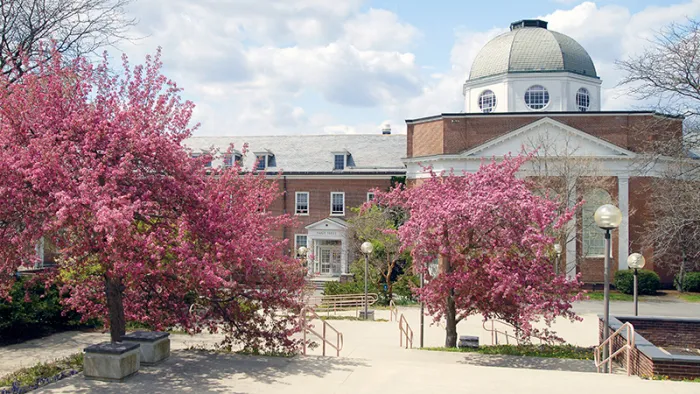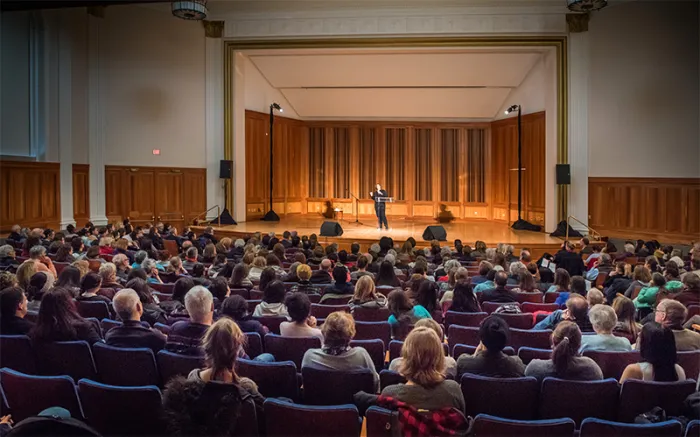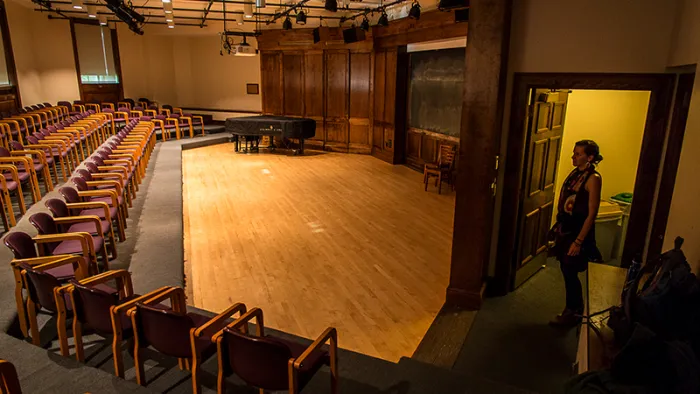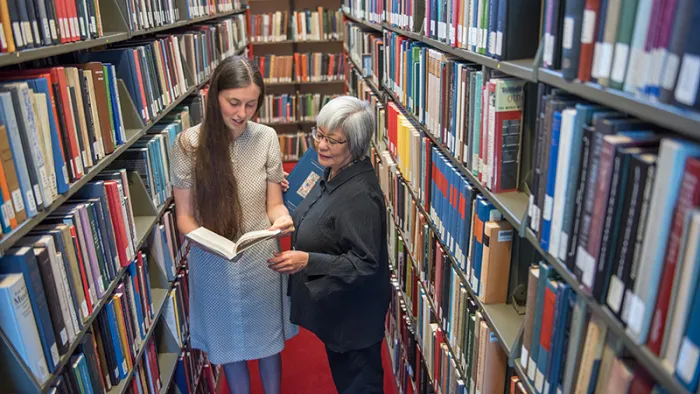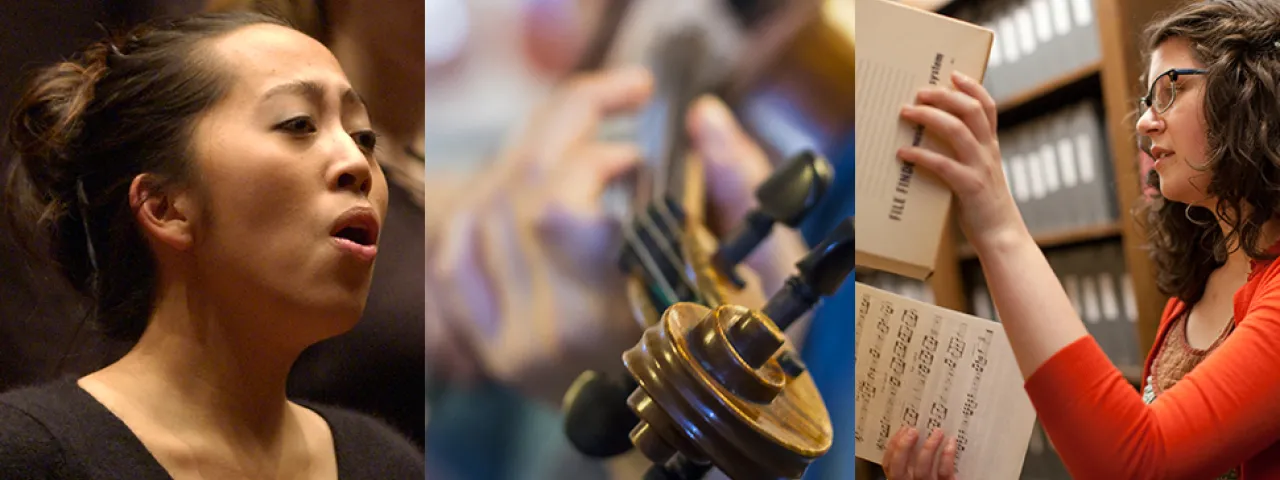
Music
Smith’s Music Department is a lively center of musical activity with classroom courses that integrate the study of global musical genres and performance practices with critical questioning of music's complex role in society. Across offerings in composition, classical music, world music, music theory and popular music, courses emphasize interdisciplinary approaches to musical knowledge, with faculty working at the intersections of American studies, anthropology, dance studies, gender studies, and political theory.
Smith faculty offer performance courses in voice and a wide variety of instruments, and members of the department direct performance ensembles. The department boasts extraordinary practice facilities and a remarkable number of notable graduates who have led distinguished musical careers in performance, scholarship and the practical world of music.
Department Updates
Concerts and Events
Check out our Performance Calendar for upcoming events and concerts.
Requirements & Courses
Goals for Majors in Music
- Have an understanding of the nature of an array of musical practices and of the nature of the various relationships among performance, improvisation, composition, and written and oral reflection about music.
- Be able to read and to think conceptually and critically about musical performance, musical composition or scores, theoretical analysis, historical inquiry, cultural study, and musical institutions. Have the ability to write cogently and coherently about these issues and perspectives.
- Understand the ethics and methods of ethnography and oral history.
- Have a vocabulary of specific pieces or repertories of music, a knowledge of the traditions from which they derive, and the ability to form analytical statements about them.
- Be able to do research in libraries, archives, and online, discriminate between legitimate and illegitimate sources of information, and understand the ethics and practice of citation.
Music Major
Requirements
Ten semester courses and four performance credits
- Basis: MUS 102, MUS 110 and MUS 202
- Electives: six four-credit courses above the 100 level. At least one must be taken in three of the following areas:
- Composition and digital music
- Ethnomusicology and world music (may include MUS 101)
- Musicology and music history
- Popular and vernacular music (may include MUS 105)
- Theory and analysis of music
- Capstone: MUS 325 normally taken in the senior year
- Performance: four credits. May consist of any combination of the following:
- Two semesters of lessons on an instrument or in voice, or
- Two semesters of conducting, or
- Four semesters of participation in an ensemble (may be the same ensemble over four semesters or multiple ensembles)
- Substitute courses (including Five College and study abroad courses) may be counted toward the major on a case-by-case basis. Requires departmental approval.
- Students may substitute one four-credit Special Studies, MUS 400, for one of the six electives in the major. Requires departmental approval.
- The S/U grading option is not allowed for courses counting towards the major, with the exception of ensembles that are mandatory S/U.
- Students may be exempted from courses required for the basis of the major as a result of Advanced Placement exams or departmental placement tests. Such exemption does not affect the number of courses required for the major.
Music Major with Capstone Recital
Majors who have demonstrated an exceptional commitment to performance studies may, before March of their junior year, audition before a department committee for admission to the capstone recital program, which consists of enrollment in MUS 940Y and the preparation of a full recital during the senior year.
Honors
Students interested in departmental honors should meet with the director of honors at the end of their junior year to discuss their project and preparation. Proposals will be due to the department by September 1st of the student's senior year.
Requirements
- GPA: calculated through the end of the junior year
- 3.5 in courses in Music
- 3.3 in courses outside Music
- Thesis (8 credits): MUS 430D or MUS 431
- History or cultural studies: a substantial research paper of approximately 50 pages.
- Composition: a work (notated or recorded) of substantial duration and scope in any genre with an accompanying essay.
- Oral examination on the subject of the thesis.
- Fulfillment of the requirements of the major by the end of the senior year.
The final grade (highest honors, high honors, honors, pass) will be calculated as follows: thesis (60 percent); final grades in music (20 percent); performance on the oral examination (20 percent).
Music Minor
Requirements
Six semester courses
- Basis: MUS 102, MUS 110, and MUS 202
- Electives: three courses, at least two above the 100 level (excluding MUS 100fm
).
- Students may be exempted from courses required for the basis of the minor as a result of Advanced Placement exams or departmental placement tests. Such exemption does not affect the number of courses required for the minor.
- The S/U grading option is not allowed for courses counting toward the minor.
Course Information
The music department’s offerings include academic and performance courses. Courses in the department are open to all students with an interest in music.
Performance courses include group instruction for beginners, ensembles, and individual lessons. Auditions are held during the fall orientation period and the first days of each semester for individual lessons (MUS 914Y, MUS 924Y, MUS 930Y) and certain ensembles. Students are accepted on the basis of musicianship, competence, and potential. Should there be no Smith College faculty teaching a particular instrument, every effort is made to provide students with a qualified instructor.
Lessons require a yearlong commitment and are normally taken in addition to a regular course load.
No more than 24 credits in performance, including participation in ensembles, may be counted toward the degree. With the exception of MUS 901, ensembles are graded S/U only. For more detailed information on instrumental and voice lessons and a list of current faculty, visit the music department website.
All students are encouraged to join ensembles and take classroom courses.
Courses
MUS 100fm Colloquium: Topics in Music-Fundamentals of Music (4 Credits)
Topics of MUS 100 especially designed for those with no previous background in music. They emphasize class discussion and written work, which consists of either music or critical prose as appropriate to the topic. Open to all students, but particularly recommended for first-year students and sophomores. An introduction to music notation and to principles of musical organization, including scales, keys, rhythm and meter. Limited to beginners and those who did not place into MUS 110. Enrollment limited to 20. {A}
Fall, Spring, Variable
MUS 101 World Music (4 Credits)
Music may not be a "universal language," but it is a universal phenomenon; every culture has something that is recognized as music. This course introduce a number of musical systems--traditional, classical and popular--from around the world and uses case studies to explore the complex relationships between music and culture. By engaging with music analytically, as musicologists (paying attention to the sounds heard) and ethnographically, as anthropologists (paying attention to the cultural context), students learn basic principles that enhance their understanding of music globally speaking. No prerequisites. {A}{S}
Fall, Spring, Variable
MUS 102 Making Music History (4 Credits)
This class is an introduction to music history that combines a close study of music from the Western classical tradition with research methodology and an orientation to the discipline of musicology. Organized by genres and concepts, the class looks at classical music as both a repertoire and an object of cultural study. In addition to covering a range of works, the course addresses their production, performance and reception through a study of their social and political context, and raises questions of power, representation and patronage. Students also examine their own ideas about the role of the artist, what it means to be a musician and the social future of this music. Students have the chance to do original research on a piece or topic of their choice and get a foundation in the College’s scholarly resources, especially the holdings at Josten Library and Special Collections. {A}{H}
Fall
MUS 105 Roll Over Beethoven: A History of Rock (4 Credits)
This course provides a critical survey of rock music, tracing the music’s development from blues and blackface minstrelsy to heavy metal, grunge and techno. Emphasis throughout is placed upon understanding musical developments in the context of American race and gender relations and the politics of youth cultures in the U.S. Discussions include: Elvis Presley and American race relations; Jimi Hendrix and the blues; girl groups; the rise of arena rock; and the significance of the DJ in hip hop. Enrollment limited to 45. {A}{H}
Fall, Spring, Alternate Years
MUS 110 Analysis and Repertory I (4 Credits)
An introduction to formal analysis and tonal harmony and a study of pieces in the standard repertory. Regular exercises in harmony. Prerequisites: ability to read standard notation in treble and bass clefs, including key signatures and time signatures and the ability to name intervals. (A placement test is given before the fall semester for incoming students.) One 50-minute ear training section required per week, in addition to classroom meetings. Enrollment limited to 20. {A}
Fall
MUS 202 Thinking About Music (4 Credits)
This course explores different approaches to the study of music as a cultural phenomenon. The course considers basic questions, such as: Why is music so often at the center of one's most profound personal and social experiences? Why is music a fundamental means of connecting with one's lives, communities and the wider world? Through in-depth reading and in-class discussion, students study the institutions of music (concerts, recording studios) and the varied practices of music making (classical, popular, amateur, professional) in order to construct a picture of the musical worlds and to understand what they say about society. {A}{S}
Spring
MUS 205mp Colloquium: Topics in Popular Music-Metal and Punk: Rock History Out Loud (4 Credits)
Heavy metal and punk rock have arguably been the definitive rock-and-roll styles of the post-1970 rock era. In this course, we explore metal and punk as interrelated musical genres, following their history and development and examining a range of social and musical issues along the way. Of particular importance will be the following: How and when did metal and punk emerge? What defines the two genres musically? What defines them socially? Taken together, how do they represent the changing status of rock music as a cultural and commercial form since 1970? Enrollment limited to 20. {A}{H}{S}
Fall, Spring, Variable
MUS 205pp Colloquium: Topics in Popular Music-Producing Popular Music: The American Music Industry (4 Credits)
During the past three decades, the music industry has undergone substantial, even radical changes. This class will focus on recent developments in the music industry, while reflecting on larger issues that have informed the making and selling of music. Among the primary questions we will consider are: how have new technologies affected the ways in which music is created, bought and sold? What relationship exists between "live" and "recorded" music in the way the music industry operates? How do legal definitions and struggles over intellectual property shape the practices of musicians and music corporations? What does it mean to work in the music industry, and to what extent should the creative labor of musicians be considered similar to or different from other types of labor? Enrollment limited to 20. {A}{S}
Fall, Spring, Variable
MUS 210 Analysis and Repertory II (4 Credits)
A continuation of MUS 110. One 50-minute musicianship section required per week, in addition to classroom meetings. Prerequisite: MUS 110 or equivalent. Enrollment limited to 18. {A}
Spring
MUS 217 Colloquium: Feminism and Music Theory (4 Credits)
In this course, students evaluate the assumptions and foundations of Western music theory, primarily under the critical guidance of feminist theory. Tonal theory is often a routine part of undergraduate music study. What are the goals and criteria of this kind of analysis? While critically examining Western music theory’s intellectual values, students develop approaches to analysis that are responsive, in a variety of ways, to queer, feminist and antiracist thought. Through readings and listening assignments, students consider various challenges to the fiction of objectivity in music analysis, including embodiment, subjecthood and identity, and the mediating force of language and concepts. Prerequisites: MUS 110. Enrollment limited to 18. (E) {A}
Fall, Spring, Variable
MUS 218 Colloquium: Music and the Moving Body (4 Credits)
This course considers connections between human movement and music from the perspective of performance, analysis, history and cognition. Discussions include music and gesture, music performance, the role of the body in listening, and the co-constitutive relationship between music and dance. Students develop a deeper awareness of music’s fundamentally embodied nature and learn about a variety of different ways in which movement-music interaction has historically shaped artistic practices. Course readings address a range of different styles including Western classical music, modernist and avant garde music, Hip hop, pop, country, gospel, West African music, Salsa and Gamelan. Enrollment limited to 18. {A}
Fall, Spring, Variable
MUS 220pb Topics in World Music-The Power of Black Music (4 Credits)
The course focuses on the musics of Africa and the African diaspora through the lens of ethnomusicology. Concentrating on selected countries, including Benin, Brazil, Cuba, Nigeria, South Africa, and the United States, it examines the musical performance of gender, race, ethnicity, and nationality and the role of music in social and political movements. The course examines the global dimensions and resonances of Africanist musical aesthetics as enabled historically and sustained through ongoing transatlantic exchanges between Africa and the African diaspora. The course also explores the issues of representation and identity in iconic works like Black Is King & Lemonade by Beyoncé. Other topics include the adaptation of hip-hop in Africa and the phenomenal popularity of West African Afrobeats in the United States and globally. Workshops conducted by visiting professional musicians and discussions on the instructor's ethnographic research in West Africa, Brazil, Cuba, and the United States. Enrollment limited to 40. {A}{S}
Fall, Spring, Variable
MUS 222 World Music Theories (4 Credits)
Each musical tradition is best explained and understood by its own system of theory. This course introduces four musical traditions and their corresponding theories: Tuvan Throat Singing, Dagomba Dance Drumming, Javanese Gamelan and Hindustani classical music. Topics include theory fundamentals, listening methods, compositional approaches and aesthetics. Learning about these traditions will open doors to new modes of listening and to hearing familiar music in a brand new way.
Fall, Spring, Variable
MUS 230 Colloquium: Music and Democracy (4 Credits)
How have social justice movements used music to mobilize people to fight for equality and rights? How have anti-democratic movements used music for reactionary ends? What is the role of music in sustaining—or eroding—democracies? This class examines a range of U.S. and global case studies, including Black Lives Matter, the abortion wars, global protest movements, and music and urban redevelopment. Through the study of national anthems, resistance songs like “Fight the Power,” and by examining the sounds of protest itself, students practice critical listening and reflect on how sound and music can press for social change--for better or worse. Students look at the role of music in democratic processes, the importance of music for belonging and citizenship, and whether and how music itself is significant to political participation. Prerequisites: MUS 102 or MUS 202. Enrollment limited to 18. {A}
Fall, Spring, Variable
MUS 231 Colloquium: From Goat Songs To Flash Mobs: Music and Theater (4 Credits)
Music and theatre are both time-based arts that involve bodies in motion in front of an audience. Though they may be considered separate disciplines, the full extent of what they share often makes them wonderfully indistinguishable. This course probes the intersections of music and theatre through a survey of genres, works, artists, and practitioners. While material covered will include clearly relevant genres such as musicals and opera, the focus will be on more difficult to categorize topics such as performance art, immersive theatre, and experimental music, in an open-minded examination of what makes this alliance so compelling. Enrollment limited to 20. {A}
Fall, Spring, Variable
MUS 233 Intro to Composition (4 Credits)
Basic techniques of composition, including melody, simple two-part writing and instrumentation. Analysis of representative literature. No previous composition experience required. Prerequisite: MUS 110 or equivalent. {A}
Fall, Spring, Variable
MUS 235 Introduction to Audio Production (4 Credits)
A hands-on introduction to the basic concepts, equipment and software involved in modern music production. This course serves as an introduction to MIDI sequencing, Digital Audio Workstations, analog and digital audio, digital audio recording, mixing and basic studio techniques. Enrollment limited to 8. Instructor permission required. (E) {A}
Fall, Spring, Variable
MUS 241 Diction for Singers (2 Credits)
In this course, students learn to use the International Phonetic Alphabet (IPA) as an efficient tool to approach accuracy in lyric diction. Choral and solo singers must frequently perform music in languages that they do not speak, and therefore often struggle to sing with accurate pronunciation. IPA is a set of orthographic characters, almost entirely based on the Roman alphabet, that standardizes phonetics across most major languages. Prerequisite: MUS 952, MUS 953, or individual voice performance lessons must be taken concurrently. Enrollment limited to 20.
Fall, Spring, Variable
MUS 249/ REL 249 Colloquium: Islamic Popular Music (4 Credits)
Offered as MUS 249 and REL 249. Music is a complex issue in many Islamic societies. There are tensions between those who believe that music has no place in Islam and try to prohibit it, those for whom it is a central component of mystical devotion, and those who tolerate it, albeit within well-defined parameters. The debate intensifies in the case of popular music, a core part of the self-identification of young people everywhere. Despite this, there is an amazing variety of vibrant popular music throughout the Islamic world. This course explores the religious debates over music and the rich musical tradition (including religious music) in Islam. Enrollment limited to 35. {A}{H}
Fall, Spring, Variable
MUS 251 Divas, Queens and Spectacle: A History of Opera (4 Credits)
This course offers an introduction to opera from the 16th to the 21st centuries, with an emphasis on gender performance, virtuosity and the unique history of opera performance at Smith College. Earlier works include Monteverdi’s Orfeo, Handel’s Rodelinda, Mozart’s Marriage of Figaro and Verdi’s Aida, while more modern and contemporary operas include Strauss’s Salome and Kaija Saariaho’s L’Amour du Loin. {A}{H}
Fall, Spring, Alternate Years
MUS 255 Girl Groups Through History (4 Credits)
The term "girl groups" typically refers to the close-harmony all-women pop groups of the 1950s and 1960s. Yet groups like the Andrews Sisters, the Shirelles, and, most famously, the Supremes, represent only one manifestation of a centuries-long musical practice in which groups of young women have sung together, from enslaved women of the medieval Islamic world to Vivaldi's young pupils at the Ospedale della Pietà to Motown. For centuries, these groups have enthralled listeners and inspired composers. This course looks at the history of this musical phenomenon, with critical attention to its spaces, reception, and relationships and what they say about gender and musicking over time. Prerequisite: MUS 102 or MUS 202. (E) {A}{H}
Fall, Spring, Variable
MUS 258/ ANT 258 Performing Culture (4 Credits)
Offered as MUS 258 and ANT 258. This course analyzes cultural performances as sites for the expression and formation of social identity. Students study various performance genres such as rituals, festivals, parades, cultural shows, music, dance and theater. Topics include expressive culture as resistance; debates around authenticity and heritage; the performance of race, class and ethnic identities; the construction of national identity; and the effects of globalization on indigenous performances. Enrollment limited to 30. {A}{S}
Fall, Spring, Alternate Years
MUS 260 The Music of J.S. Bach (4 Credits)
This course is an introduction to the music, life, and legacy of the composer Johann Sebastian Bach, whose music inspired generations of composers and performers across genres. In addition to studying some of his works in depth and his biography, we will explore the cultural and historical context in which he worked, raising questions about performance, instruments, religious life, and patronage. We also look at his influence on music in the nineteenth century, the controversies around his St. John Passion in the twentieth, and his legacy in the twenty-first century. {A}{H}
Fall, Spring, Variable
MUS 262 Experimental Music (4 Credits)
What counts as music? Who decides? Can anyone make music? This course raises these and other questions by focusing on experimental music. The course explores the history and practice of experimental music, focusing on text, graphic and other forms of notation. The course also looks at the history of experimental music in performance and makes in-class performances of several key pieces. Through reading and practice, the course asks questions about musical authority, skill and even failure, and the role of institutions in shaping musical ideas. {A}{H}
Spring
MUS 321 Seminar: Songwriting (4 Credits)
This seminar is a practicum on songwriting. Through weekly creative assignments, in-class workshops and listening, students develop and strengthen their skills as musicians, performers and lyricists. Students try several songwriting and compositional techniques, and create and finalize work to be presented in a final concert. Students should have a basic working knowledge of music notation and theory, including harmonic analysis. Prerequisites: MUS 110 or equivalent. Restrictions: Juniors and seniors only. Enrollment limited to 12. Instructor permission required. {A}
Fall, Spring, Variable
MUS 325 Seminar: Writing About Music (4 Credits)
This course considers various kinds of writing--from daily journalism and popular criticism to academic monographs and scholarly essays--that concern the broad history of music. Via regular writing assignments and group discussions of substance and style, students have opportunities to improve the mechanics, tone and range of their written prose. Required of senior majors; open to others with instructor permission. Restrictions: Juniors and seniors only. Enrollment limited to 12. Instructor permission required. {A}
Spring
MUS 341 Seminar in Composition (4 Credits)
Prerequisite: a course in composition. May be repeated for credit. Restrictions: Juniors and seniors only. Enrollment limited to 12. Instructor permission required. {A}
Spring
MUS 345 Intro to Electro-Acoustic Music (4 Credits)
Introduction to musique concrète, analog synthesis, digital synthesis and sampling through practical work, assigned reading and listening. Enrollment limited to 8. Instructor permission required. {A}
Fall
MUS 400 Special Studies (1-4 Credits)
In the history of Western music, world music, American music, composition and digital music, or music theory and analysis. For juniors and seniors. Instructor permission required.
Fall, Spring
MUS 430D Honors Project (4 Credits)
Department permission required.
Fall, Spring
MUS 431 Honors Project (8 Credits)
Department permission required.
Fall
MUS 901 Chamber Music Ensembles (1 Credit)
Exploration and coaching of varied repertory for duos and small ensembles. May be repeated for credit. Open to instrumental students. Instructor permission required. {A}
Fall, Spring
MUS 903 Conducting (2 Credits)
Introduction to the art of conducting. This course examines philosophical and practical aspects of the modern conductor’s role. Discussions include a musical gestural vocabulary, baton technique and score study/internalization of the printed page. May be repeated for credit. Prior music performance experience and study of Western music theory is highly recommended. Instructor permission required. {A}
Fall, Spring, Alternate Years
MUS 904 Introduction to Violin Ensemble (2 Credits)
This is a group ensemble course focused on violin playing at the beginner level. Students learn how to perform with proper technique in a group setting on violin as well as how to read music. Listening assignments highlight the versatility of violin playing throughout various time periods and musical styles. Prerequisite: Any topic of MUS 100 (may be concurrent.) Enrollment limited to 8. Instructor permission required. (E)
Fall, Spring, Annually
MUS 906 Class Piano (2 Credits)
This course is an introduction to basic keyboard skills for beginner pianists. Students develop technique and music-reading skills through solo repertoire and ensemble playing. Applied music theory such as major and minor scales, keyboard harmony and improvisation is also explored. Repeatable for credit. Prerequisite: MUS 100. Enrollment limited to 8. Instructor permission required.
Fall, Spring, Variable
MUS 914Y First Year Performance (2 Credits)
This is a full-year course. Credits: 4, at the completion of two semesters. Prerequisite: MUS 100 or equivalent. Department permission required. {A}
Fall, Spring
MUS 924Y Second Year Performance (2 Credits)
This is a full-year course. Credits: 4, at the completion of two semesters. Prerequisite: MUS 914Y. Department permission required. {A}
Fall, Spring
MUS 930Y Advance Performance (2 Credits)
This is a full-year course. Credits: 4, at the completion of two semesters. Prerequisite: MUS 924Y. Department permission required. {A}
Fall, Spring
MUS 940Y Capstone Recital (4 Credits)
Reserved for seniors who have been approved for the Music Major with a Focus in Performance. No early registration. Credits: 8, at the completion of two semesters. Audition required. Department permission required. {A}
Fall, Spring
MUS 951 Introduction to Singing (1 Credit)
This class is designed for students with little to no musical experience. In this course, students develop a sustainable singing technique, expand their range and learn the basics of reading sheet music. Repertoire is selected based on student abilities and interests and has in the past included vocal jazz, classical choral pieces and folksongs. Interested students should email the instructor with a description of your musical interests and experience (if any). May be repeated once for credit. S/U only. Instructor permission required. {A}
Fall, Spring
MUS 952 Smith College Glee Club (1 Credit)
Formed in 1885, the Smith College Glee Club performs annually at Commencement and Christmas Vespers, on Family Weekend, for Autumn Serenade and at college events including Opening Convocation and Rally Day. The Glee Club selects music from a diverse repertoire, including major works for treble voices, jazz, contemporary, folk music of the U.S. and from international traditions. Guest choirs from such universities as Harvard, Rutgers, Cornell, Michigan and Virginia regularly come to campus to collaborate on a major work. Auditions for Glee Club are normally held during orientation and in the first two weeks of classes in both semesters. S/U only. Instructor permission required. {A}
Fall, Spring
MUS 953 Smith College Chamber Singers (1 Credit)
Members of the Glee Club are eligible to audition for the highly selective Smith College Chamber Singers. The internationally known Chamber Singers have performed throughout the world since 1951. Touring normally every two years, the program provides financial assistance enabling all members to travel regardless of financial need. Auditions for Chamber Singers are held during orientation, in the first two weeks of classes in the fall semester and, occasionally, before the spring semester. S/U only. Instructor permission required. {A}
Fall, Spring
MUS 954 Smith College Orchestra (1 Credit)
A symphony orchestra open to Smith and Five College students. The orchestra gives at least one concert each semester and performs at annual events such as Family Weekend and Christmas vespers. S/U only. Instructor permission required. {A}
Fall, Spring
MUS 955 Smith College Javanese Gamelan Ensemble (1 Credit)
One concert per semester. Open (subject to space) to Smith and Five College students, faculty and staff. No prior experience necessary. S/U only. Instructor permission required. {A}
Fall, Spring
MUS 956 Smith College Jazz Ensemble (1 Credit)
The jazz ensemble performs at least one concert per semester. Favoring traditional big band instrumentation and performing a variety of jazz styles, the ensemble is open to Smith and Five College students, faculty and staff (space permitting) with all levels of music training. Prior jazz experience is recommended but not required. S/U only. Instructor permission required. {A}
Fall, Spring
MUS 957 Smith College Wind Ensemble (1 Credit)
At least one concert per semester. Open to Smith and Five College students, faculty and staff with prior instrumental experience. S/U only. Instructor permission required. {A}
Fall, Spring
MUS 958 Smith College Celtic Music Ensemble: The Wailing Banshees (1 Credit)
At least one concert per semester. Open to Smith and Five College students, faculty and staff. S/U only. Instructor permission required. {A}
Fall, Spring
MUS 959 Handbell Choir (1 Credit)
The choir performs at the Family Weekend Montage concert, the annual Advent Dinner for the Roman Catholic community, Christmas Vespers and the second semester Spring Ring. In addition, the choir occasionally performs in off-campus community concerts. S/U only. Instructor permission required. Enrollment limited to 15. {A}
Fall, Spring
MUS 960 Chinese Music Ensemble (1 Credit)
This course introduces students to the modern Chinese ensemble and a variety of Chinese music styles. The course is designed to be hands-on and experiential, encouraging students to explore the basic ideas of Chinese music and culture through rehearsals, practices and performances. At least one concert per semester. S/U only. Enrollment limited to 18. Audition required. Instructor permission required. {A}
Fall, Spring
MUS 961 Electric Guitar Lab/Ensemble (1 Credit)
Designed for beginner and near beginner students interested in the electric guitar. S/U only. Enrollment limited to 8. Instructor permission required.
Fall, Spring, Annually
MUS 962 Five College Collegium (1 Credit)
The Five College Collegium is the flagship ensemble of the Five College Early Music Program. The ensemble is made up of experienced singers and instrumentalists from the Five College Consortium, and prepares four large scale projects in the course of the academic year for public performance. The Collegium rotates its rehearsal residency among the schools in the Five College system, and focuses on repertoire from the Medieval, Renaissance, and Baroque periods. Whenever possible, the Collegium invites professional musicians as guests to work with the ensemble on material that is relevant to the current project. S/U only. Enrollment limited to 25.
Spring
Crosslisted Courses
ANT 258/ MUS 258 Performing Culture (4 Credits)
Offered as MUS 258 and ANT 258. This course analyzes cultural performances as sites for the expression and formation of social identity. Students study various performance genres such as rituals, festivals, parades, cultural shows, music, dance and theater. Topics include expressive culture as resistance; debates around authenticity and heritage; the performance of race, class and ethnic identities; the construction of national identity; and the effects of globalization on indigenous performances. Enrollment limited to 30. {A}{S}
Fall, Spring, Alternate Years
FYS 100 My Music: Writing Musical Lives (4 Credits)
This first-year seminar begins with an exploration of students' own musical lives. What does the particular constellation of material that ones calls "My Music" tell us about who one is, where one comes from, and how one relates to the world? After analyzing and comparing musical lives within the class, students read selected case studies and collaboratively design a musical biography project. Each student curates one person’s musical life story, gathering data through one-on-one interviews, weaving together their interlocutor’s words with their own interpretations, and ultimately reflecting on what they have learned from the experience. Restrictions: First years only; students are limited to one first year seminar. Enrollment limited to 16. WI
Fall, Spring, Variable
MUS 231 Colloquium: From Goat Songs To Flash Mobs: Music and Theater (4 Credits)
Music and theatre are both time-based arts that involve bodies in motion in front of an audience. Though they may be considered separate disciplines, the full extent of what they share often makes them wonderfully indistinguishable. This course probes the intersections of music and theatre through a survey of genres, works, artists, and practitioners. While material covered will include clearly relevant genres such as musicals and opera, the focus will be on more difficult to categorize topics such as performance art, immersive theatre, and experimental music, in an open-minded examination of what makes this alliance so compelling. Enrollment limited to 20. {A}
Fall, Spring, Variable
Performance Study
The music department offers a range of performance courses: individual lessons (MUS 914Y, 924Y, 930Y and 940Y); chamber music coaching (MUS 901); conducting (MUS 903); and large ensembles (MUS 951 and above).
Individual voice and instrument performance courses consist of weekly private lessons, with specific expectations determined by each instructor. Lessons require a yearlong commitment and are normally taken in addition to a regular course load. Two such courses may be taken concurrently by petition only for students who have declared the music major or minor. Petitions are due to the music department by the last day of the pre-registration period.
Admission to individual lessons, chamber music, and some ensembles is determined by audition during fall semester orientation period and the first days of the semester. Students are accepted on the basis of musicianship, competence and potential. With the exception of voice, some prior experience is assumed. Information and sign-up sheets for auditions may be found at the Music Department office.
When no instructor for a particular instrument is available at Smith College, every effort is made to provide students with qualified instructors from the Five College community. Such arrangements may require Smith students to travel to other campuses within the Five College system. Students wishing to study performance with Five College faculty must obtain departmental approval.
All performance students are encouraged to study music in the classroom. Non-majors and non-minors should talk with their instructors about which courses best complement their interests.
No more than 24 credits in performance may be counted toward graduation. This includes participation in the various large ensembles described below.
All large ensembles are graded on an S/U basis.
Individual performance lessons carry the following numbering sequence and credits:
MUS 914Y First year of study
This is a full-year course. {8} {A} Credits: 2. Normally offered each academic year
MUS 924Y Second year of study
This is a full-year course. Prerequisite: MUS 914Y. {8} {A} Credits: 2. Normally offered each academic year
MUS 930Y Third and fourth years of study
Prerequisite: MUS 924Y. This is a full-year course. {8} {A} Credits: 2. Normally offered each academic year
MUS 940Y Capstone Recital
Reserved for seniors who have been approved for Concentration in Performance. Two hours of performance lessons per week during the senior year. {8} {A} Credits: 4. Normally offered each academic year
MUS 901 Chamber Music
Weekly group meetings for exploration and coaching of varied repertory for duos and small ensembles. Open to instrumental students by permission of instructors. May be repeated for credit. {8} {A} Credits: 1. Normally offered both fall and spring semesters
MUS 903 Conducting
Introduction to the art of conducting. This course examines philosophical and practical aspects of the modern conductor’s role. Topics include a musical gestural vocabulary, baton technique and score study/internalization of the printed page. Prior music performance experience and study of Western music theory is highly recommended; instructor permission required. May be repeated for credit. {8} {A} Credits: 2. Normally offered in alternate years
All students are encouraged to join a choral ensemble. The dynamic Smith College Glee Club performs annually at Commencement and Family Weekends, Montage, Autumn Serenade, Christmas Vespers, and at various college events including Opening Convocation, Otelia Cromwell Day and Rally Day. The Glee Club selects music from a diverse repertoire, including major works for treble voices, jazz, contemporary, and folk music of the U.S. and from international traditions. Every spring, glee clubs from such universities as Harvard, Rutgers, Cornell, Michigan and Virginia come to campus to collaborate on a major work. Recent performances have included the Mozart Requiem, Orff’s Carmina Burana and Brahms’ Ein Deutsches Requiem. Auditions for Glee Club are normally held during orientation and the first two weeks of classes in both semesters.
Members of the Glee Club are eligible to audition for the highly selective Smith College Chamber Singers. The internationally known Chamber Singers have performed widely since 1951. Touring every two years, the program provides financial assistance enabling all members to tour regardless of financial need. Auditions for Chamber Singers are held after Glee Club auditions have concluded.
Students who would like to try singing in a choir for the first time should schedule an interview with the instructor of Introduction to Choral Singing, a course that introduces students to the world of choral music.
Introduction to Choral Singing, Glee Club and Chamber Singers meet on Mondays and/or Wednesdays in the late afternoon.
MUS 951 Introduction to Choral Singing
{8} {A} Credits: 1; normally offered both fall and spring semesters
MUS 952 Smith College Glee Club
{8} {A} Credits: 1; normally offered both fall and spring semesters
MUS 953 Smith College Chamber Singers
{8} {A} Credits: 1; normally offered both fall and spring semesters
MUS 954 Smith College Orchestra
A symphony orchestra open to Smith and Five College students, and members of the community. The orchestra gives at least one concert each semester and performs at annual events such as Family Weekend and Christmas vespers. Rehearsals on Tuesday evenings. {8} {A} Credits: 1; normally offered both fall and spring semesters
MUS 955 Smith College Javanese Gamelan Ensemble
One rehearsal per week; one concert per semester. Open (subject to space) to Smith and Five College students, faculty and staff. No prior experience necessary. Rehearsals on Wednesday evenings. {8} {A} Credits: 1; normally offered both fall and spring semesters
MUS 956 Smith College Jazz Ensemble
The jazz ensemble rehearses once per week on Wednesday evenings 7–9 p.m. in Earle Recital Hall, and performs at least one concert per semester. Favoring traditional big band instrumentation, and performing a variety of jazz styles, the ensemble is open to Smith and Five College students, as well as and members of the community (space permitting, and by permission of the instructor) with all levels of music training. Prior jazz experience is recommended but not required. {8} {A} Credits: 1; normally offered both fall and spring semesters
MUS 957 Smith College Wind Ensemble
One rehearsal per week; at least one concert per semester. Open to Smith and Five College students, faculty, staff and members of the community with prior instrumental experience. Rehearsals on Monday evenings.{8} {A} Credits: 1; normally offered both fall and spring semesters
MUS 958 Smith College Irish Music Ensemble: The Wailing Banshees
One rehearsal per week; at least one concert per semester. Open by audition or permission of the director to Smith and Five College students, faculty and staff, and members of the community. {8} {A} Credits: 1; normally offered both fall and spring semesters
MUS 959 Handbell Choir
The choir rehearses twice weekly and performs at the Family Weekend Montage concert, the annual Advent Dinner for the Roman Catholic community, Christmas Vespers and the second semester Spring Ring. In addition, the choir occasionally performs in off-campus community concerts. Rehearsals are Tuesdays and Thursdays at 5 p.m. in the John M. Greene Hall Handbell Room. {8} {A} Credits: 1; normally offered both fall and spring semesters
MUS 960 Chinese Music Ensemble
This course introduces students to the modern Chinese ensemble and a variety of Chinese music styles. The course is designed to be hands-on and experiential, encouraging students to explore the basic ideas of Chinese music and culture through weekly rehearsals, practices, and performances. One rehearsal per week; at least one concert per semester. Open by audition or permission of the director. S/U only. Limited to 18. {A}
MUS 961 Electric Guitar Lab/Ensemble
Designed for beginner and near beginner students interested in the electric guitar. Enrollment limited to 8. Instructor permission required.
Complete online exam before 11:59 p.m. on Thursday, August 29, 2024
Incoming students considering Music 110 should take the music theory placement test. Please note that incoming students cannot register for Music 110 without taking this test. It will assess familiarity with key and time signatures, standard pitch and rhythmic notation, and intervals. The online placement exam is available on Moodle.
Placement Exam Instructions
Placement auditions for instrument or voice lessons are held during orientation and the first days of the semester. Information will be posted later in the summer regarding auditions.
The Department of Music offers a placement exam to determine the appropriate level of music theory instruction for incoming students. The exam assesses knowledge of basic Western tonal music concepts. Students will be placed into Fundamentals of Music (MUS100) or Analysis and Repertory (MUS110). The exam will be available on Moodle starting on Tuesday, August 1 and must be completed by the first day of classes. It is not graded and is not part of your academic record. The exam consists of:
- identifying pitches and accidentals in treble and bass clef
- identifying meters from rhythmic notation
- identifying scales and key signatures
- briefly describing your musical experience and training
The placement test must represent your own work and must be taken in accordance with Smith College’s Academic Honor Code. You may not use notes, textbooks, or other resources to aid you during the exam. Each student may take the exam only once. There is no time limit.
Assessment
The following are the three (3) possible results of the placement exam:
- 100: The student has placed into Fundamentals of Music (MUS100) and can pursue MUS110 following the completion of MUS100.
- 110*: The student has too much background for Fundamentals of Music but may find MUS110 challenging. This is a gray area and consultation with the theory instructor is recommended. For those in this area who wish to pursue enrollment in MUS110, consider supplemental study, such as private tutoring sessions through the Jacobson Center (paid by the college), or self-directed study. The “Fundamentals” section of the free online textbook Open Music Theory is a recommended resource for self-directed study.
- 110: The student has placed into MUS110.
Instructions
- Log into Moodle using your Smith ID and password.
- Access the Music Theory Placement Exam.
- Click “Enroll Me” to gain access to the Moodle page and the exam document.
- Complete the quiz under the heading “Music Theory Placement Exam - Fall 2024”. Please note: The exam will go online on August 1, 2024.
- Take as much time as you need to complete the exam. When you’re finished, click the “Submit” button.
If you have any questions or concerns, please email Maeve Sterbenz (msterbenz@smith.edu). Good luck!
Faculty
Please contact Anna Goudreau with questions about instruments not listed here, or to reach any of these instructors.
- Phil Acimovic: Javanese Gamelan Ensemble
- Claire Arenius: drums
- Jamie Balmer: guitar
- Anthony Berner: violin
- Hannah Berube: clarinet
- Matthew Cory: electric and upright bass
- Laurie Ellington: voice
- Justina Golden: voice
- Ronald Gorevic: viola
- Donna Gouger: trumpet
- Charles Huang: oboe
- Karl Knapp: cello
- Bruce Krasin: saxophone
- Yang Liu: piano
- Joy Lu: Chinese Music Ensemble
- Meghan MacFadden: Wind Ensemble
- Felix Margolin: piano
- Rory McLean: bagpipe
- Scott Pemrick: trombone
- Thomas Pousont: organ
- Gabe Ramey: bassoon
- Ellen Redman: flute, piccolo, Irish flute, Wailing Banshees
- Joseph Ricker: classical guitar, electric guitar, guitar, Electric Guitar Lab/Ensemble
- Alice Robbins: gamba
- Genevieve Rose: Jazz Ensemble
- Emily Samuels: recorder
- Gary Sienkiewicz: tuba
- Sheffra Spiridopoulos: French horn
- Felice Swados: harp
- Timothy Van Egmond: dulcimer
- John Van Eps: drums, marimba
- Sarah Vincelett Dredge: voice
- Max Wareham: banjo
- Anna Goudreau
Administrative Assistant - Shelley Latham
SmithArts Marketing and Communications Manager - Jaz Tupelo Dand
Concert Events Specialist
- Raphael Atlas, Professor Emeritus of Music
- Peter Bloom, Grace Jarcho Ross 1933 Professor Emeritus of Humanities and Professor Emeritus of Music
- Jane Bryden, Iva Dee Hiatt Professor Emerita of Music
- Ken Fearn, Professor Emeritus of Music
- Monica Jakuc Leverett, Elsie Irwin Sweeney Professor Emerita of Music
- Grant Moss, Senior Lecturer Emeritus in Music and Organist to the College
- Joel Pitchon, Professor Emeritus of Music
- Richard Sherr, Caroline L. Wall ’27 Professor Emeritus of Music
- Ruth Solie, Sophia Smith Professor Emerita of Music
- Karen Smith Emerson, Elsie Irwin Sweeney Professor Emerita of Music
- Donald Wheelock, Irwin and Pauline Alper Glass Professor Emeritus of Music
Performance Calendar
All Music Department events are free and open to the public. No tickets or reservations required (with the exception of Valley Classical Concert series events which require tickets through the VCC website or by calling (413) 586-0458).
Five College Music
Facilities
The Department’s instrument resources include excellent performance pianos and keyboard instruments: two Steinway “D”s, a Hamburg Steinway “C,” three harpsichords and three pipe organs (in the Helen Hills Hills Chapel and John M. Greene Hall) are regularly used for teaching and performance. The department’s fortepiano was built in 1985 by Robert E. Smith after a design by Conrad Graf.
The Department also has various woodwind, brass, and stringed instruments available for student use.
The Digital Music Lab is home to thirteen workstations with 88-key weighted keyboards. The DML computers hold many exciting music software programs, including music notation software (Sibelius, Noteflight), Digital Audio Workstations (Reaper, Audacity), and other programs (Max MSP, SPEAR). Students who would like to request access to the Digitial Music Lab should email Anna Goudreau at agoudreau@smith.edu.
Opportunities & Resources
About the Department
The Smith College Music Department is busy making music throughout New England and the world. Below are some live recordings or CD selections of our faculty members and students.
Overture from Candide, Leonard Bernstein Smith College Orchestra
“O Sailor” from Here Be Sirens, Kate Soper Gelsey Bell, Kate Soper, Brett Umlauf, sopranos
Ave Regina Caelorum, Joseph Reinberger Smith College Glee Club
The Cup of Tea/The Old Copperplate/Star of Munster, traditional Wailing Banshees, Ellen Redman, director
'O Fortuna' from Carmina Burana, Carl Orff Smith College Glee Club and Orchestra with The Yale and WPI Glee Clubs
This Little Light of Mine, arr. Jerry Noble Smith College Glee Club and Chorus
Sign Up for Our Newsletters
Contact Music
Sage Hall
Smith College
Northampton, MA 01060


